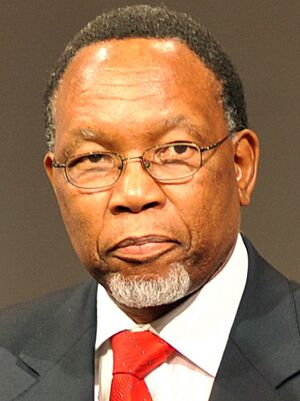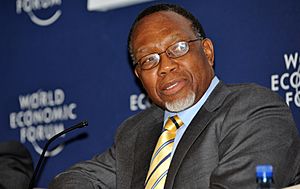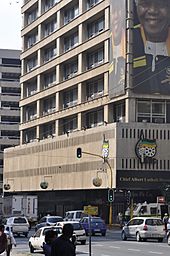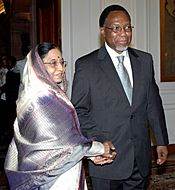Kgalema Motlanthe facts for kids
Quick facts for kids
Kgalema Motlanthe
|
|||||||||||||||||||||||||||||||||
|---|---|---|---|---|---|---|---|---|---|---|---|---|---|---|---|---|---|---|---|---|---|---|---|---|---|---|---|---|---|---|---|---|---|

Motlanthe in 2009
|
|||||||||||||||||||||||||||||||||
| 3rd President of South Africa | |||||||||||||||||||||||||||||||||
| In office 25 September 2008 – 9 May 2009 |
|||||||||||||||||||||||||||||||||
| Deputy | Baleka Mbete | ||||||||||||||||||||||||||||||||
| Preceded by |
|
||||||||||||||||||||||||||||||||
| Succeeded by | Jacob Zuma | ||||||||||||||||||||||||||||||||
| 6th Deputy President of South Africa | |||||||||||||||||||||||||||||||||
| In office 9 May 2009 – 26 May 2014 |
|||||||||||||||||||||||||||||||||
| President | Jacob Zuma | ||||||||||||||||||||||||||||||||
| Preceded by | Baleka Mbete | ||||||||||||||||||||||||||||||||
| Succeeded by | Cyril Ramaphosa | ||||||||||||||||||||||||||||||||
| 8th Deputy President of the African National Congress | |||||||||||||||||||||||||||||||||
| In office 18 December 2007 – 18 December 2012 |
|||||||||||||||||||||||||||||||||
| President | Jacob Zuma | ||||||||||||||||||||||||||||||||
| Preceded by | Jacob Zuma | ||||||||||||||||||||||||||||||||
| Succeeded by | Cyril Ramaphosa | ||||||||||||||||||||||||||||||||
| 14th Secretary-General of the African National Congress | |||||||||||||||||||||||||||||||||
| In office 20 December 1997 – 18 December 2007 |
|||||||||||||||||||||||||||||||||
| President | Thabo Mbeki | ||||||||||||||||||||||||||||||||
| Preceded by |
|
||||||||||||||||||||||||||||||||
| Succeeded by | Gwede Mantashe | ||||||||||||||||||||||||||||||||
| Member of the National Assembly | |||||||||||||||||||||||||||||||||
| In office 6 May 2009 – 7 May 2014 |
|||||||||||||||||||||||||||||||||
| In office 6 May 2008 – 25 September 2008 |
|||||||||||||||||||||||||||||||||
| Constituency | National list | ||||||||||||||||||||||||||||||||
|
|||||||||||||||||||||||||||||||||
| Personal details | |||||||||||||||||||||||||||||||||
| Born |
Kgalema Petrus Motlanthe
19 July 1949 Boksburg, South Africa |
||||||||||||||||||||||||||||||||
| Political party | African National Congress | ||||||||||||||||||||||||||||||||
| Spouses |
Mapula Mokate
(m. 1975; div. 2014)Gugu Mtshali
(m. 2014) |
||||||||||||||||||||||||||||||||
| Children |
|
||||||||||||||||||||||||||||||||
| Occupation |
|
||||||||||||||||||||||||||||||||
| Nicknames |
|
||||||||||||||||||||||||||||||||
| Military service | |||||||||||||||||||||||||||||||||
| Allegiance | African National Congress | ||||||||||||||||||||||||||||||||
| Branch/service | uMkhonto weSizwe | ||||||||||||||||||||||||||||||||
| Years of service | 1977–1987 | ||||||||||||||||||||||||||||||||
| Battles/wars | Resistance to apartheid | ||||||||||||||||||||||||||||||||
Kgalema Petrus Motlanthe (born 19 July 1949) is a South African politician who was the third president of South Africa. He served from 25 September 2008 to 9 May 2009, after President Thabo Mbeki resigned. After his presidency, Motlanthe became the deputy president under Jacob Zuma until 2014.
Motlanthe grew up in Soweto after his family was forced to move from Alexandra during apartheid. Apartheid was a system of racial segregation and discrimination in South Africa. As a young man, he joined uMkhonto weSizwe, the armed wing of the African National Congress (ANC), to fight against apartheid.
Because of his anti-apartheid work, he was arrested. From 1977 to 1987, he was a political prisoner on Robben Island. After his release, he became a leader in the National Union of Mineworkers. When apartheid ended, he became a top leader in the ANC.
Motlanthe became president for a short time to lead a caretaker government until the next election. He is known for being a calm and thoughtful leader. Many people in the ANC respect him, and he is often seen as one of the party's leading thinkers.
Contents
Early Life and Activism
Kgalema Motlanthe was born on 19 July 1949 in Alexandra, a township near Johannesburg. His family was later forced by the apartheid government to move to Meadowlands, a part of Soweto. His father worked as a cleaner, and his mother was a machinist in a clothing factory.
He attended Pholosho Primary School and later Orlando High School in Soweto. As a child, he was an altar boy and was influenced by the Anglican church and leaders like Archbishop Trevor Huddleston. As he grew older, he was inspired by the Black Consciousness Movement, which encouraged Black people to be proud of their identity and to stand up for their rights.
Joining the Fight Against Apartheid
After finishing high school, Motlanthe began working. In the 1970s, he secretly joined uMkhonto weSizwe (MK), the armed group of the African National Congress (ANC). The ANC was banned in South Africa at the time. His MK unit was involved in recruiting new members and planning acts of sabotage against the apartheid government.
In 1976, Motlanthe was arrested for his work with MK. He was found guilty under the Terrorism Act and sentenced to prison.
Years on Robben Island
Motlanthe spent nearly ten years in prison on Robben Island, from 1977 to 1987. This was the same prison where Nelson Mandela was held. While there, he helped teach younger prisoners about politics and history.
He later said that his time in prison was enriching. He explained that the prisoners formed a strong community, shared everything, and read every book they could find. He said, "To me those years gave meaning to life."
Career After Prison
The very first meeting we had, I was struck by his analytical capabilities and powers and by his disciplined approach to everything. Here was someone who had great dignity and humility.
Shortly after his release in 1987, Motlanthe joined the National Union of Mineworkers (NUM). This was a powerful union for mine workers, led by Cyril Ramaphosa. Motlanthe became an education officer, helping to teach workers about their rights.
He remained a member of the ANC, which was unbanned in 1990. In 1992, when Ramaphosa left the NUM to become secretary general of the ANC, Motlanthe was chosen to take his place as the union's leader.
Rise in the ANC
ANC Secretary General
In 1997, at a major ANC conference, Motlanthe was elected as the party's secretary general. This is one of the most powerful positions in the ANC. It was said that senior leaders like Nelson Mandela supported him for the role. He was so popular that when his name was announced, supporters carried him to the stage on their shoulders.
He served as secretary general for ten years, from 1997 to 2007. During this time, the ANC's membership grew from about 386,000 to over 620,000. He was known for his good organizational skills and for helping to implement important ANC policies.
ANC Deputy President
In December 2007, the ANC held its national conference in Polokwane. At this conference, Motlanthe was elected as the deputy president of the ANC. He won with over 60% of the vote.
The conference was also where Jacob Zuma was elected as the new ANC president, replacing Thabo Mbeki. Motlanthe was seen as a unifying figure who could work with both sides. He gave a famous speech at the conference where he honestly pointed out the party's weaknesses, which earned him a lot of respect.
Becoming President of South Africa
In 2008, Motlanthe was appointed as a Member of Parliament and a Minister in the Presidency. This was his first job in the national government.
A few months later, in September 2008, President Thabo Mbeki was asked by the ANC to resign. The party then chose Motlanthe to become the next president of South Africa. On 25 September 2008, Parliament officially elected him. He received 269 votes.
It was widely understood that Motlanthe would be a "caretaker president." This meant he would lead the country until the 2009 general election, when Jacob Zuma was expected to become president.
A Short but Important Presidency
Motlanthe was president for just over seven months. In his first speech, he promised to continue the policies of the previous government to ensure stability. He kept many of the same ministers in his cabinet, including the respected finance minister, Trevor Manuel.
One of his most important decisions was to change the Minister of Health. He replaced Manto Tshabalala-Msimang with Barbara Hogan. This marked a major shift in the government's policy on HIV/AIDS. Hogan's leadership was praised for ending an era of denial and focusing on providing life-saving medicine.
During his presidency, Motlanthe also dealt with challenges in neighboring Zimbabwe. He supported a power-sharing agreement to bring stability to that country.
Deputy President and Later Career

After the 2009 election, Jacob Zuma became president, and he appointed Motlanthe as his deputy president. Motlanthe served in this role from 2009 to 2014. He was in charge of several important government councils, including the National AIDS Council and the committee for the 2010 FIFA World Cup.
In 2012, at the ANC's conference in Mangaung, Motlanthe challenged Zuma for the party presidency. Zuma won the election by a large margin. After the vote, Motlanthe chose not to run for any other leadership position in the ANC. This signaled his decision to step back from frontline politics.
Retirement from Government
In March 2014, Motlanthe announced his resignation from Parliament and the government. In his farewell speech, he said it was time for new leaders with fresh ideas to take the country forward. He received a standing ovation from other Members of Parliament.
Since retiring, Motlanthe has remained an active and respected figure. He often speaks about the need for the ANC to renew itself and uphold its values. He now leads the ANC's O. R. Tambo School of Leadership, which trains new party leaders. He also heads the Kgalema Motlanthe Foundation, which works on social and economic development in Africa.
Personal Life
In 1975, Motlanthe married Mapula Mokate. They have three children. The couple separated and their divorce was finalized in 2014. In May 2014, he married his longtime partner, Gugu Mtshali. Motlanthe is known to be a big fan of jazz music.
See also
 | Calvin Brent |
 | Walter T. Bailey |
 | Martha Cassell Thompson |
 | Alberta Jeannette Cassell |



